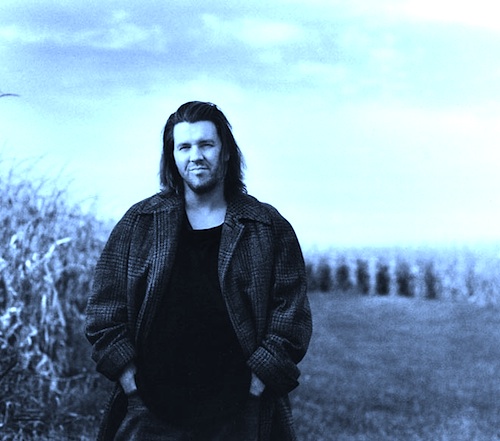
By David Ross. Every so often I dip into contemporary literature to confirm my sense that I’m not missing very much. I recall forays into the work of Paul Auster, Angela Carter, Douglas Coupland, Dave Eggers, Bret Easton Ellis, Jonathan Franzen, Michel Houellebecq, Jay MacInerney, Cormac McCarthy, Rick Moody, Chuck Palahniuk, Salman Rushdie, Jeanette Winterston, and other passing fancies of Time and Newsweek. Zadie Smith waits her turn on my shelf. All this sifting of silt has produced only a few glinting nuggets. I discovered in Houellebecq a fierce and welcome fellow despiser of modernity (see my comments here), and something even more in David Foster Wallace: a vast nineteenth-century mind struggling to find itself.
The “covering cherub,” in Blake’s parlance, was the postmodernism that DFW formally embraced against the grain of his personality. He was profoundly sincere, empathetic, and humane, a believer in “the sub-surface unity of things,” as he puts it in his famous Kenyon graduation address of May 2005, and yet devoted his career to self-conscious intricacies of irony and gamesmanship. He made great art in this mode – only Nabokov and Borges are his postmodern betters – but it was not, I can’t help feeling, the art he was born to make.
I have additional misgivings about his prose, though he is the only prose writer of his generation even worth noting. While meticulously attentive to his art, he was ambivalent about the formality of his art, the ideal of the well-wrought urn. His language is often splendid, but always splendid despite a certain scruffiness and loose-limbed sprawl. My eye is always instinctively performing the function of an editor, pruning, reshaping. He was too invested in his own unpretentiousness, too much infected with the modern American ideal of jeans and sandals, which ultimately expresses a yearning to be liked, to be no better or different than the rest of the crowd. I suppose this is the symbolic meaning of DFW’s hallmark bandana, an accouterment of kitchen and field workers, housewives and athletes. Great writers don’t care about being liked. They scorn our right to judge. They discover themselves amid the execrations of the crowd.
 Even with his foibles and arguable failings totted up, DFW was the redeemer of his literary generation. He saved it from the humiliation of being the first generation in American history to lay nothing – not the least nosegay – on the graves of Emerson, Thoreau, and Whitman. He saved it from the gaping wound of a great naught.
Even with his foibles and arguable failings totted up, DFW was the redeemer of his literary generation. He saved it from the humiliation of being the first generation in American history to lay nothing – not the least nosegay – on the graves of Emerson, Thoreau, and Whitman. He saved it from the gaping wound of a great naught.
DFW’s rightly famous Kenyon Commencement Speech (here and here) has become a pop-cultural touchstone. Perhaps enthusiasm for it has already become a bit of a cliché. Yet I defy anybody to listen attentively without succumbing to its moral seriousness and sinking into an inner hush just as the initially boisterous Kenyon audience stills into an outer hush. In the guise and moment of his speech, DFW defies the default setting of the culture. He sheds his celebrity – the unpeelable skin of the Oprah era – and becomes the conduit and servant of a message more urgent than himself. Thus Emerson spoke from the podium of the Concord lyceum.
Alex Niven, a friend of a friend, comments intelligently on the speech and on much else concerning DFW.
Posted on August 24th, 2011 at 2:04pm.
David: that was very well put, as always. I can’t relate to much post ’90s literature, but I do make the effort every now and then to read some of it. I picked up David Foster Wallace’s Infinite Jest and made it through about fifty pages. I just couldn’t get further than that. His talent is undeniable, but the sprawling and unfocused execution just lost me. Also, is it just me, or was there an anti-capitalist message in the book?
I’m sure DFW was a political liberal, but I credit him with a remarkable even-handedness when it comes to left-right issues. See for example his demolition of “PCS” (politically correct speech) in his essay on “American Usage and Authority” in “Consider the Lobster”; see also his respectful treatment of John McCain in the same volume. I suspect there was a certain incongruity between DFW’s elemental spiritual values and perspectives and his surface politics. Certainly DFW grasped the fiasco of the sixties social experiment and commented brilliantly on it.
Was DFW anti-capitalist? I think he was unhappy with modern materialism, in which profit-seeking corporations and stuff-seeking consumers are obviously implicated. This is not to say that he advocated an alternate economic order or failed to recognize the bounty that capitalism uniquely provides. The trick, I suspect he would say, is to invent, sell, trade, etc., without losing sight of deeper considerations and commitments, to resist becoming homo economicus.
Of the authors you list, I have read only Franzen, and think him an excellent writer. His “The Corrections” was a wonderful book, and his others too, if not up to that standard, are quite absorbing.
A contemporary writer I think well worth the time is Richard Russo. Except for his most recent, I am hard-pressed to say which of his works I enjoy most. I regret that he has produced so little.